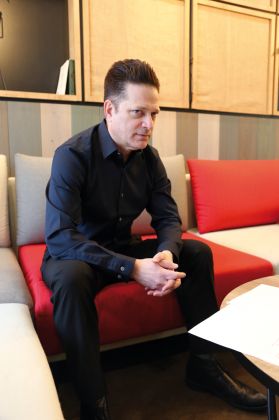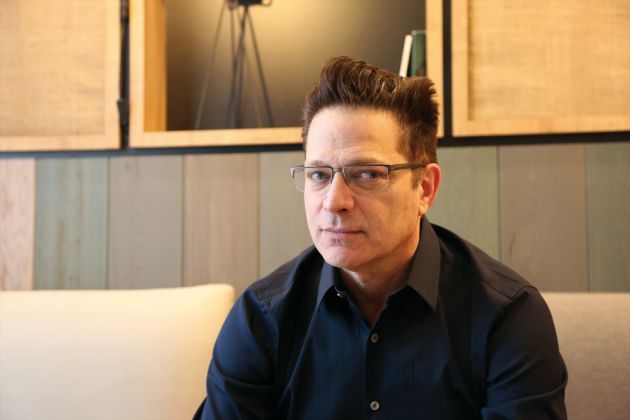How is the training of lawyers in China and the US different? Why is ADR not as popular in America? How to keep up with work in different time zones? All about this in our interview with Douglas Litowitz, a teacher at the School of American Law in Ukraine, organized by the UCU School of Law in conjunction with the Chicago-Kent College of Law
 |
Маєте Телеграм? Два кліки - і ви не пропустите жодної важливої юридичної новини. Нічого зайвого, лише #самасуть. З турботою про ваш час! |
— Douglas, you are a teacher of one of the modules of the School of American Law in Ukraine. What is your module about? What useful information can students learn from your module?
— I’m part of the School of the American Law which is based in Chicago at IIT Chicago-Kent College of Law. We train lawyers in Ukraine (and all over Eastern Europe) in American Law, and then they can come to America to get a Master’s degree and stay in America or come back to Ukraine.
I teach business law mostly but the first course we teach is Introduction to American Law. This is because Ukraine is a part of a different legal tradition — the so-called Civil Law tradition, which came from Rome and is in France, Germany, and Italy. America was a colony of England so our legal tradition is from the English Common Law tradition. So first we have to give students an introductory class in Common Law reasoning and then we can move them on to their main interest —business and corporate law.
— Besides, you are an expert in business and corporate law, compliance, and financial law. Tell me more about your career path. How did you get to this?
— In the American system, you spend three years in law school after university. I was a philosophy major in university and then I went to law school at Northwestern University in Chicago and then practiced corporate, securities and financial law. After that, I was a law professor and I worked in a hedge fund — doing sophisticated trading, corporate and securities law. So really for the most of my career I have taught and worked, juggled both.
— Why did you choose these areas for your career growth?
— Business law is the most creative law, but and a lot of people don’t understand that or believe it! I think that if you help a business to grow then it expands organically like a plant or tree. As it grows new problems and new issues arise, so you grow with your client. That is a very positive, very helpful thing to see this growth.
Litigation, which is going to court, is fighting about something that has happened in the past. There is a great demand for people to move forward in Ukraine and so the students especially insist on taking business and intellectual property classes.
— In your practice If you have some dispute, do you usually use alternative dispute resolution (ADR) methods firstly or go to the court?
— In America, ADR costs a lot of money. In many other countries (in Asia and Europe) ADR gives you a quicker answer with less money. In America, it gives you a very-very expensive answer. A lawsuit that costs $500 to file in a court can cost $10,000 to file and then hundreds of thousands of dollars in fees to the arbitrator. I am not a believer in privatizing the judicial system, I believe that the courtroom should be available to all persons, open, and transparent.
 — And what about mediation, negotiation, facilitation?
— And what about mediation, negotiation, facilitation?
— The problem with that is that our system of common law is based on an adversarial model of two sides fighting: in this fight, the truth is said to emerge, with the judge being neutral and not as active as in the Civil Law tradition. In recent years, lawsuits have become so adversarial that the case becomes a spending contest on which party can last the longest. So neither side is willing to negotiate, they will push as hard as they can for the clients. It’s more common in your tradition to smooth things over and reach an early resolution.
For example, I teach in China, Thailand, and other countries. In most of their contracts there will be a clause in every contract that states: ‘If there is a dispute, we must go to mediation first. If that doesn`t work, we go to arbitration. Or also it may state: ‘first we talk’. That language doesn`t exist in America. I would say that mediation, negotiation, arbitration have not worked out well in America.
This means we have to prepare Ukranian students to set up transactions that will not result in a dispute. We have to give the Ukrainian students what I call “double translation”. The first translation is words — they have to speak the American language as we speak it. Second, they have to translate concepts, to take our concepts and be able to translate and compare them to the Ukrainian counterparts. So It’s a very different system and we have different ways of doing business. And over time more and more American companies will come to Ukraine because Ukraine has a very strong and growing entrepreneurial spirit, very strong IT, so there a demand for business lawyers who can interface with American lawyers.
— What has been the best and moment of your career? And the worst?
— The best moment of my career was setting up business branches of companies in foreign countries. I worked at a large hedge fund and set up branches all over in Europe and Asia. And as I see expansion and growth, it is very rewarding for me. The worst is probably when people go into a court and fight for the very small things and that makes me feel like they are missing the point of law. They fight over technicalities and very minor quibbles, which is very common in America. So that is probably the lowest point I’ve seen.
— After graduating from Law school and passing the bar exam, is it necessary to take a specialist course in corporate law to become a business lawyer?
— No. In the American system, you just learn by doing it. You get out and you practice business law and you pick it up. We don’t have a special degree in business law, though some schools have what they call a special concentration (a set of courses) in it. One difference in the Common and Civil Law traditions is that your system has historically allowed students to get an undergraduate degree in law. In America, you can’t be a law major at the university level. You have to major in something else like literature or science and then go for three more years to law school. That allows you to take the bar exam. Most of my Ukrainian and Asian/European students majored in law already at the undergraduate level. Your system of education has many advantages over ours, so does ours over yours. So they are just different. I tell my students that neither is better or worse: we are not here to judge each other but learn from each other.
— Tell me more about these advantages.
— The Civil Law tradition is more logical, it is based on codes. And codes are much more deductive reasoning. You find the right section — you apply it.
The Common Law has laws based on applying the history of previous decisions. So you have to take all of the previous decisions and apply them to your case and that is a process of doing research and then trying to convince a court that the previous decisions control your current case. There are more moving parts in the Common Law system, and a lot of creativity, though less legal certainty. It is very argument focused. However, the American law of business and finance is quite code-based, so it is a natural fit for Ukrainian students.
— You live in the Chicago area but handle cases all over the country. How do you keep up with this? Share your time management secrets.
— I just work around the clock because most of my clients are from China who have invested in America and lost their money, or they trying to invest in America and they need a business structure. So I work mostly reverse hours because China is twelve to fourteen hours ahead. So it’s very difficult and I have assistants and translators to help me.
It’s very important that younger people have a global mindset and that they speak other languages and understand legal concepts from other systems. So I think that is the most important message for practicing lawyers now. Many countries have nationalist movements (including America) but the future is global.
— So you work at night.
— Yes, I go to bed at 4 and sleep until 12.
— Maybe, that is the secret. Besides, what are the three (five) skills that would be helpful for a lawyer to be effective in the modern world?
— The most important is to be multilingual and global, so you can service clients from another culture. For example, let’s say you are a lawyer in Kyiv, and an American company (it could be MacDonald’s or KFC, Microsoft, Google, Amazon, Starbucks, etc.) and they want to do business in Ukraine. Their lawyer will contact you and they will use American concepts like ‘corporation, LLC, LLP’ and different types of business structures. And your job will be to help them understand the business structures in Ukraine and how they are different or similar to the American structures. So that helps Americans who have come to Ukraine. That is a market for inbound legal services. At the same time, Ukrainians have products (whether it’s software, or ideas, or trademarks, or physical products) that are exporting or ripe for exporting or licensing. How do you structure these products when sitting across the table from Americans? So translation of concepts is a really important skill.
The other very important skill is understanding that the West (Germany, France, America, England) has strong financial markets and financial regulation that is going to be essential for Ukraine. Ukraine needs to build up its stock market and people need to trust in the judges and trust in the regulators. There are bank failures here, we’ve all read about it.
Do you want my personal opinion? People here are emotionally sad but they shouldn’t be. Maybe because I’m American, I’m optimistic, but I like to think about Ukraine in terms of judo or MMA. Because Ukraine is situated between Russia and Europe, it was beaten down for a long time, but it can take that history and flip it around. Because Ukraine’s location and its people and history are also the reason for its strength. People want to do business in Ukraine.
There is a lot of Anti—Russian sentiment in America now so there is a stronger positive feeling towards Ukraine. There is also a lot of intellectual property coming fromUkraine and young people want to do business, and they want a fair system. So I think that it’s very positive vibe and I don’t know why people are so serious and emotionally sad. People in Ukraine are very serious. You don’t see them smiling but I think they should, I think that they are on the right path. If you go back and you look at where Taiwan, South Korea and Singapore were 40 years ago no one knew about them, but now they have established markets, banking, legal system, and now they are very strong.
I think the same thing will happen in Ukraine. I feel strongly about it. My students are very positive, very open, very excited, they like to travel, they are open to different cultures and I think that’s the future.
— You’ve worked in Hong Kong for a few years and taught American law at several universities in China. Are there any differences you have noticed in a jurisprudence work in China and Hong Kong? What difficulties did you face while working with people from China?
— Absolutely. There is a huge difference because the Chinese and Asian method of education is so different than the Western and especially the American system. This gets reflected in how the lawyers think. In China, for example, they are taught to memorize sections of the code word for word, and then repeat the code word for word. If they miss a word they get punished. In America, there is no memorization. The teacher will ask for your opinion. What do you think, how would you use the code to argue this way, how would you use it to argue the opposite way, depending on who your client was? What do you think about the code? Is it right, is it wrong? Is it good, is it bad? So the Chinese have been kind of trained not to ask certain questions. My students in Eastern Europe can ask those questions, they capable of asking question… very capable (laughing). Maybe before, when there was a strong influence of the USSR, and during those years there were certain things that they couldn’t say and think. But it’s in their DNA to ask questions, and that’s a positive thing.
My biggest struggle in China was telling people: ‘What if we do this different thing? Let’s structure it in a different way’. And they would say ‘no it’s either A, B, or C’, and I would say ‘what about D? We create a little bit of A and B’. No, it’s very rigid.
— If you could give one piece of advice to law students, what would it be?
— The world is becoming international but in every country there are nationalist movements that are anti-global. My advice is to join international people. In the USA, for example, there is a very big divide between those who want to welcome immigrants, who like diversity, who think that the US is not the leader or the policeman of the world, and that everyone is useful. They are very tolerant of different lifestyles and different approaches. On the nationalist side, however, there are about 50% of people that believe that the USA is the best country in the world and it has to keep everybody out, and we should be only in favor of our country.
This same divide is almost in every country now. But I think that in the end internationalist will win. Because the world is getting smaller, and the differences between people are less. So my advice is to be with the internationalist, who believe that you speak many languages, you understand many systems and you are open and you are listening.
I tell my students all the time: ‘be careful about being patriotic’. I am American, but if I say that I am patriotic, than what did I do to achieve being American? I was just born there by accident. That is not a great accomplishment (laughs). You have to accept the good and the bad of your country, and be careful saying: ‘My country is always the best’.
I’ll say one more thing. Ukraine is getting a lot of attention in the press because of Trump's relationships with Ukraine. And it’s not necessarily a bad thing. People know that Ukraine is in the process of getting rid of corruption, trying to make a judiciary and lawyers better. The students know that this has to be done to make a legal system strong. They believe that in the past certain people stole state assets, and escaped punishment because they had connections. And that’s a dangerous thing for lawyers to believe. So I think people should be happier about the direction of the country, and I am happy to be here.
— Which books (fiction and non-fiction) would you recommend to our readers?
— I wrote a book last year that was published about France Kafka and the law. He was a lawyer in Prague. But he is most known for his writing. He wrote The Metamorphosis about a man who wakes up one morning and is turned into a cockroach.
The best for me is anything by George Orwell: 1984 and Animal Farm are very important. Kafka, Emile Zola. I like to read Nietzsche, Dostoevsky. I like the psychological stuff.
I'll tell you a funny story. My students in Kazakhstan bought me a book and said: ‘you must read it’. It’s called ‘Professor Dowell's Head’. It’s about a professor, who has an assistant that is jealous of him. So the assistant cuts off his head and keeps it alive with air and food. And all day long the head lives in the laboratory and reads books. And then the assistant steals the ideas from the head and writes his books. So I told my students: ‘Maybe it’s not a good idea to give to your professor a book about professor’s head being cut off, and attached to pipes that give it air and food’. But it was a good book (laughs).
There is a book by the same author Alexander Belyaev that’s about a man, who tries to collect all the air in the world to sell it to people. Which is funny, because now I have a bottle of water with me, and people now are capturing the water and privatizing it. So there is a danger in everything becoming private. Turning nature in objects that could be bought and sold. I think that some things should not be bought and sold, some things are beyond the market. It isn’t possible to build happiness on other peoples’ misery.





